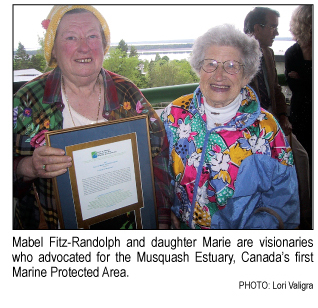|
 Editor's Notes Editor's Notes
Visionaries: An eye toward the future
[printer
friendly page]
As a boy, Roger Berle would obey
his mother’s request to take out the trash, which at that
time meant dragging the bag from under the kitchen sink and tossing
it into the ocean near their home on Cliff Island off of Portland,
Maine. Berle cringes at that memory now. The 2007 recipient of
the Gulf of Maine Council’s Longard Award, Berle was honored
for his commitment to protect and maintain open land on Cliff
Island for recreation, educational opportunities and resource
protection.
Ten other visionaries, two from
each of the five states and provinces in the Gulf of Maine watershed,
won Council awards as well. Each brings a spirit of energy, commitment
and creativity to protect the marine environment in the Gulf
of Maine. Many are grassroots and volunteer efforts by individuals
or groups. In this issue of the Gulf of Maine Times,
writer Susan Llewelyn Leach tells the stories behind their accomplishments.
As Berle says, when it comes to conservation, the bottom line
is that you’re either going forward or moving back. There’s
no standing still.
Other stories in this issue include
an update on an invasive species census, using cell phone technology
to monitor owls, and dam removal to restore fish runs. Through
these stories we can see our good fortune that the Gulf of Maine
attracts a lot of people with big and small visions for the future
of our environment.
Lori Valigra
Dear
Editor,
I read
with great interest your article, “Toxins in Casco Bay,”
which appeared in the summer issue of the Gulf of Maine Times.
I wanted to add that Friends of Casco Bay has also been running
periodic tests of stormwater entering the bay and results have
shown detectable levels of multiple herbicides and at least one
insecticide and fungicide — chemicals used by homeowners
and commercial applicators for lawn and yard care. Some of the
concentrations found in these samples have exceeded aquatic life
criteria and may be adversely impacting aquatic invertebrates
and fish species.
With these
test results in mind and the fact that distribution and use of
lawn and garden pesticides has increased dramatically in Maine
in recent years (more than three million pounds in 2004, mostly
weed and feed products for lawns), Friends of Casco Bay and the
Maine Board of Pesticides Control created first the BayScaper
program for Casco Bay and then the statewide initiative, YardScaping.
These are essentially public education/outreach programs with
the message that beautiful lawns, gardens and landscapes can
be created through ecologically based practices which minimize
reliance on water, fertilizer and pesticides.
The centerpiece
of our current YardScaping efforts is the Back Cove YardScaping
Demonstration Project — the Back Cove being an integral
part of Casco Bay. The city of Portland, one of the 30 or so
YardScaping partners, donated about three acres (1.2 hectares)
of land along the cove to develop a site that will demonstrate
the basic YardScaping principles for both the general public
and professionals. It’s also likely that the site will
be the base for a training program for landscapers and others
developing landscapes. The first phase of the project is almost
complete: The Maine Conservation Corps, City of Portland Parks
& Recreation Department and Maine Master Gardeners have constructed
two-thirds of the 1,000-foot-long, seven-foot-wide (305-meter
long, two-meter-wide) walking path that will wind through the
gardens. The path is linked at both ends and through two spurs
to the existing Back Cove Trail, which is very popular with hikers
and bikers.
The project
Web site is: http://www.yardscaping.org/demo/portland.htm.
Thank
you for your interest!
Paul Schlein
Public Information Officer
Maine Board of Pesticides Control
Augusta, Maine
http://www.thinkfirstspraylast.org
|
![]()
